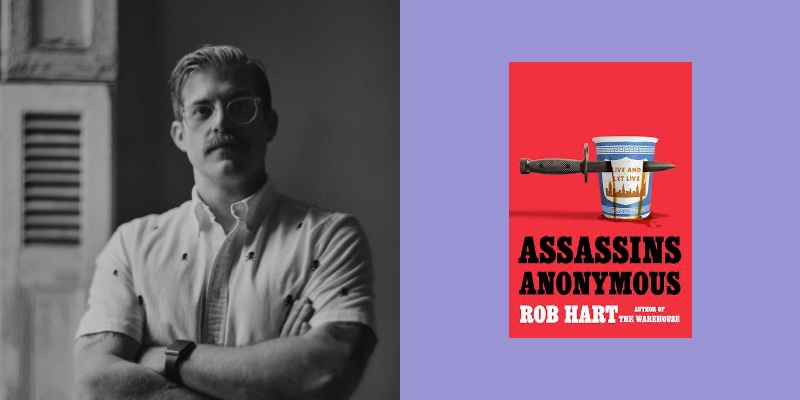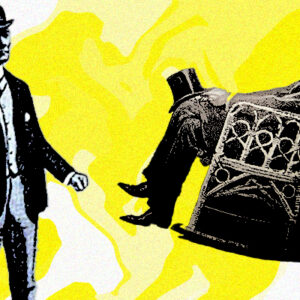One of the dark pleasures of the assassin genre is watching the protagonist prepare the hit. Whether it’s the titular killer in “Day of the Jackal” meticulously securing the supplies he’ll use to assassinate Charles de Gaulle, or John Wick figuring out which rifle will allow him to plow through the hundred bodyguards standing between him and a target, there’s usually quite a bit of attention devoted to the buildup, which powers the suspense.
With his latest novel, “Assassins Anonymous,” crime novelist Rob Hart flips that traditional structure neatly on its head. The book features an ultra-skilled hitman named Mark who’s joined a twelve-step group for killers trying to reform themselves. Without spoiling too much, Mark finds himself the target of shadowy forces that force him on a globe-trotting quest—but despite people gunning for him, he wants to stay committed to nonviolence. It’s a neat subversion of the genre: Instead of devoting pages to how efficiently a hitman can plow through their opposition, he’s generating suspense by having Mark struggle not to kill people.
Hart sat down to chat about the book, what he took from the broader assassin genre, and how he’s already working on an “Assassins Anonymous” sequel.
Did you look to any particular assassin movies or books for inspiration when writing “Assassins Anonymous”? Or did you try to avoid the influence of anything that’s come before?
I’m a big fan of hitman movies, and I wouldn’t say there was one in particular that spurred me on, but a lot of this book clicked for me while I was watching “Nobody” with Bob Odenkirk. It’s a ton of fun, and I liked it a lot—but it plays in that familiar format: assassin retires, doesn’t want to kill, gets a slight nudge, and slaughters a hundred people. And I remember thinking: “Well what if someone stuck to their decision? What would that look like?”
I think I need to give some credit to “The Professional,” too. That’s one of my favorite movies of all time, and part of the reason I like it so much is for Jean Reno’s deep well of sadness in that. It’s a lonely life, and you can see the way that he avoids personal connection, and within that, it’s stunted him emotionally to a large degree—13-year-old Natalie Portman sometimes feels more mature and grown-up than he is.
Ultimately I would say this is my love letter to the genre.
I recently watched Jean-Pierre Melville’s “Le Samourai” and David Fincher’s “The Killer” back-to-back, and it re-emphasized to me how the assassin genre is one of pretty indelible tropes: the hitman has one person (or animal) he cares about, the hitman is corralled into doing one last job, etc. What do you think lies at the heart of the genre’s appeal? Why do creators keep turning to it decade after decade?
The assassin fits within that same mold as the gunslinger or the private eye or the ronin samurai. They’re guided by an internal moral compass that sometimes feels more precise than the law. So I think there’s some wish fulfillment there. We live in a chaotic world and we crave order, and we want stories about characters who do the right thing, even if they do it the “wrong” way.
I’m not saying that the only true path to justice is killing people. I wanted to drill down into that moral gray area a bit. When these characters kill someone, we excuse it, because they killed a “bad” guy. But what makes someone bad? Are they bad, or troublesome for someone else? And don’t they have someone in their life who loves them—someone whose life is worse now?
Another element of wish fulfillment is that these characters are almost supernaturally talented, and that’s just fun to watch. I think that’s a reason characters like Jack Reacher are so popular. Nothing gets past them, and they’re incredibly formidable. I think a lot of us struggle with our fears, and our abilities related to navigating that, so seeing someone act so efficiently and so precisely makes us feel a little stronger.
Of course, you also can’t talk about the genre without talking about “John Wick.” It’s been ten years since the first movie came out, and the franchise seems more popular than ever. Do you think folks have attached to it so strongly because of the world-building, the gun-fu, or just the beauty of Keanu? Did it have any impact on your writing of “Assassins Anonymous”?
The John Wick films had a huge impact on me, and there are a lot of reasons those movies work. First and foremost, Keanu Reeves is a national treasure, and the character was instantly iconic. The world-building is incredible—just like we gravitate toward these character tropes, I think people are entranced by the idea of a shadow world that exists beyond our own. It means the world is a bigger and more incredible place.
And there are a ton of action movies featuring hitmen, but these were directed by Chad Stahelski, who started out as a stuntman. So he’s got an innate understanding of how action works. You look at “John Wick 4” and that’s got at least three all-time action sequences—the traffic circle, the overhead apartment shootout, and the staircase. I think a lot of directors would kill to have one of those. And it had Donnie Yen as a blind assassin.
I think, most of all, nothing that happens is cool just for the sake of being cool. It’s cool in a way that serves the story, the action, and the characters.
Your previous two books, “The Warehouse” and “The Paradox Hotel,” blended crime and sci-fi. With this new novel, you’ve drifted back toward the crime fiction that defined your earlier novels, specifically the Ash McKenna PI series. What is it about crime as a genre that keeps pulling you back?
I still think of “The Warehouse” and “The Paradox Hotel” as crime fiction; the first is about corporate crime, and the second is a murder mystery. But I also think genre labels are more for marketing departments and booksellers than they are for writers; I just want to write weird, fun stuff that entertains me, and hopefully, some other people along the way.
It was nice to pull away from the sci-fi aspect a little, only because that took a ton of time and research. Writing about time travel sounds like a lot of fun, until you do it, and you realize how massively complicated it is. So after two pretty hefty projects I wanted to write something a little more stripped-down. This one took a little research, but for the most part, I could sit down and just write.
In the end though, this was just the story that spoke to me in the moment.
You’ve already written the sequel to “Assassins Anonymous.” You’re no stranger to evolving characters over multiple books—I’m thinking of how Ash McKenna evolved into a decent private detective over the course of the five novels in that series. What’s your approach to figuring out where a character needs to go next in terms of their growth and the inner challenges they face? And in light of that, what’s next for Mark?
I just filed the sequel with my editor, and it was a little more challenging than I thought it would be. The first book is about Mark, and his journey, and his struggle with not killing people, because he is addicted to it—the rush, the affirmation from his employers, the feeling like he was a god. He comes to some level of peace with himself there, which means the next book can’t be about that. So one of the things I did was shift the POV a little. Mark is still there, but the sequel follows another member of the group; her backstory, and her journey.
And then it was a matter of figuring out what her reason for killing was, and how she had to grow—which had to be different from Mark’s. I think I found a pathway that doesn’t feel like it’s covering the same ground. Plus, there’s still plenty of stuff to throw at Mark. Because now he’s sponsoring someone, and that’s a whole other can of worms.
I’m excited. With the characters who come in and out, I feel like I could write ten more of these, easy.

















